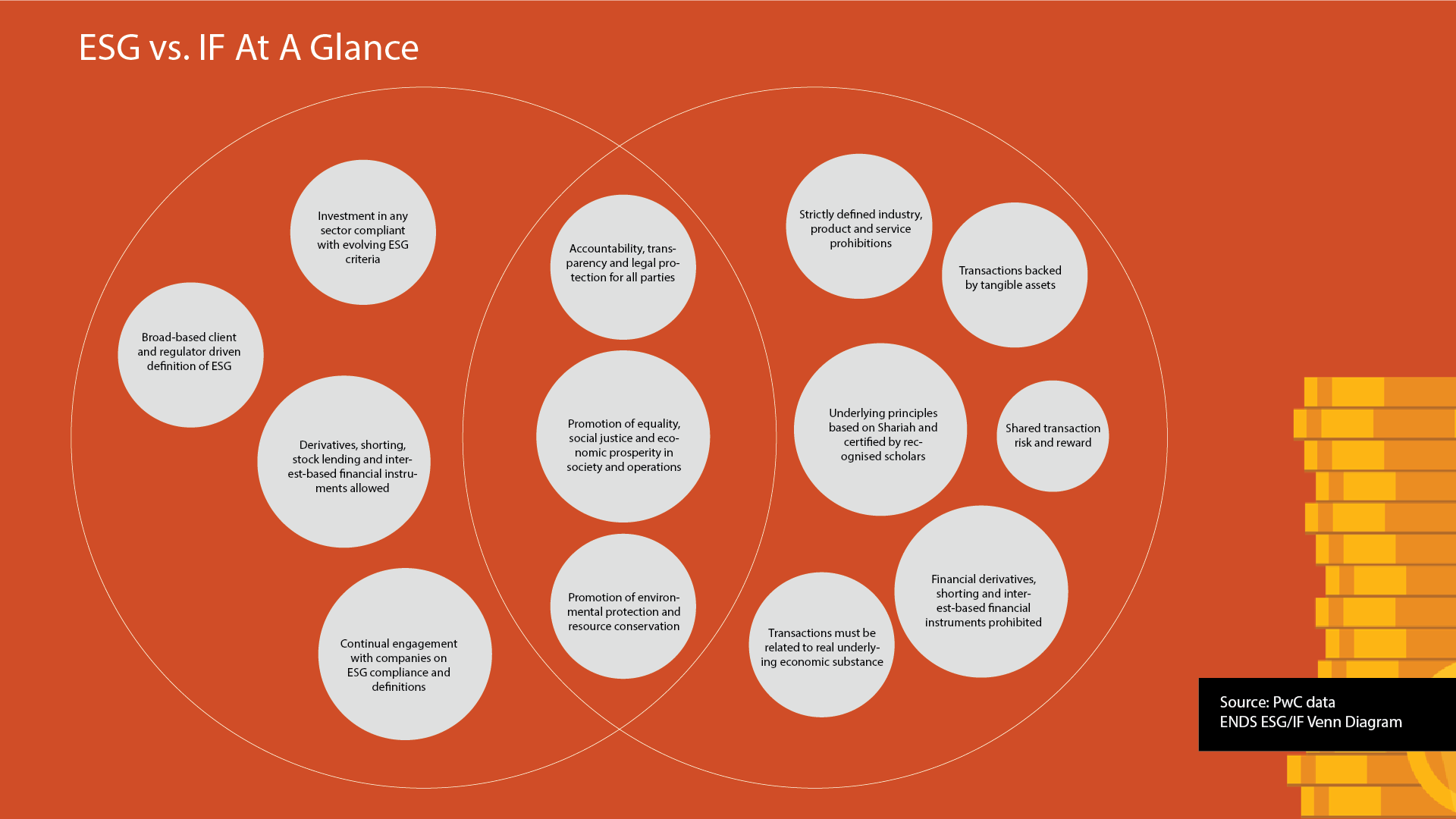Understanding the similarities between ESG and Islamic Finance investment principles holds the key to the opportunity for banks and asset managers in the Middle East
Islamic Finance and sustainable or responsible investing have a great deal in common. They share a fundamental principle, which is the avoidance of harm. But does this common ground mean these two branches of finance could actually converge, as some have claimed? It is an intriguing possibility, not least because if Islamic Finance products could be readily certified as ESG compliant, that could open up a large and fast-growing global market to Middle Eastern banks with Islamic Finance capabilities.
Many of the principles of Islamic Finance (IF) certainly look a lot like the principles of responsible investing, now usually labelled Environmental, Social and Governance (ESG) investing. In principle there is the possibility of a market convergence that would bring IF products such as Sharia-compliant sukuk bonds or ‘Waqf’ (also known as endowment) funds into the portfolios of ESG-hungry investors worldwide, and give Islamic banking institutions a growing share of what is likely to become one of the biggest, and perhaps the dominant, investment sector of the future.
The fact that such a convergence has yet to materialise does not mean it cannot happen. But first, ESG investors and IF professionals will need to come to terms with the differences as well as the similarities between the two investment approaches. They will need to recognise that these remain different markets, where certification, scope of metrics and underlying mindsets are not yet in sync – and where understanding these differences is the key to grasping the opportunity.
How similar is similar?
Islamic Finance is a principles-based approach to investing. It uses criteria such as shared reward, a reliance on real underlying assets and the avoidance of pure financial transactions, as well as accountability, transparency, and the prohibition of certain products and services. It is an approach designed to ensure not only compliance with recognised Islamic principles but also the stability and sustainability of the investment. It can be seen as a long-term, low volatility risk reduction strategy, recognisable to all investors.
ESG investing has a comparable focus on long-term risk reduction and a broad set of impact metrics also designed to limit harms. However, the ESG approach is more wide ranging, including environmental scores to measure and limit carbon emissions, pollution, biodiversity and waste, and social scores such as gender and diversity, human rights and labour standards. The governance element in ESG covers oversight and accountability, compensation and political lobbying. Although there is not yet a set global definition or ‘taxonomy’ of the ESG investment proposition, recognised standards are emerging (for example the Global Reporting Initiative (GRI) standards or EU’s Taxonomy Regulation) and will continue to develop.
It is easy to see why IF and ESG investing are often seen as sharing a common domain, with the potential to meet the demands of a common investment market. The connections between the two approaches are real. Yet there are also some deep-rooted divergences in principle and in practice, which finance professionals need to understand before they can construct a common ESG/IF investment proposition.

In financial markets, size matters
The sustainable investment industry is larger than the world of Islamic Finance, and it is growing faster. One recent estimate from Bloomberg puts the likely size of the ESG asset market at $53 trillion by the end of 2025, which would mean it would account for around a third of the projected global total. This would represent a more than doubling of assets under management in less than a decade (ESG assets accounted for $22.8 trillion in 2016).
By contrast, Islamic investment products will amount to less than $3 trillion by 2025, assuming the market continues to grow at around 10%, in line with the latest forecast from S&P Global Ratings.
This market size mismatch is important, because it means analytical capability and data needs are inevitably greater in the ESG market. Although the IF skillset is comparable to that of ESG investment, the ESG process requires a great deal of proprietary data, and that in turn means that entering the ESG space may involve extensive investment in skills and processes for Middle Eastern banks specialising in Islamic Finance.
There is also a mismatch of scope between the worlds of ESG and IF investment. Islamic Finance principles are more narrowly defined than ESG principles: prohibited products such as alcohol and non-halal foods, and prohibited practices such as high leverage, interest and shorting are all relatively easy to identify and quantify, whereas ESG issues in scope are more loosely defined and subject to continual evolution. The wider scope of ESG means that many factors that could be critical to an ESG investment decision are not directly relevant to IF investing, and IF investors approach governance in terms of accountability, transparency and trustworthiness while ESG investors are more likely to prioritise shareholder voting on governance issues.
There are also issues that are in scope for Islamic investors but play little or no part in ESG calculations, such as limitations on financial structures or the avoidance of investments based on intangible assets (in ESG, by contrast, tangible assets such as natural resources that may have environmental impacts are often seen as the problem rather than the solution).
This market size mismatch is important, because it means analytical capability and data needs are inevitably greater in the ESG market.
Think mindset, think opportunity
Certainly, many of these differences are in process, rather than in fundamental principles, but it is still important to recognise that the worlds of IF and ESG have different mindsets: ESG investing is fast evolving, it is more proactive than defensive, and it is highly competitive (and combative). The IF world is faith-based, reliant on tried and tested principles, and there is an established governance structure. There is a difference in outlook, between the ESG focus on creating sustainability through continuing investor-company engagement, and the focus on the rules-based avoidance of harm in Islamic Finance.
Yet in the right hands, differences represent an opportunity. One clear opportunity for finance professionals seeking to connect the worlds of ESG and IF investing is to pay close attention to certification. ESG and IF investments will need to be certified in ways that make these two forms of responsible investing mutually recognisable and trusted. In practice, that is likely to mean a form of certification of ESG compliance for eligible IF products.
Certification of Sharia compliance is relatively straightforward. Although there are numerous authorities that scrutinise IF investments, they are widely recognised and regulated by Shariah Boards and scholars. And while there is, as yet, no widely accepted ESG certification for IF financial products, banks themselves have the opportunity to drive the process forward.
There is evidence that this is already happening – recent examples include the sustainability linked sukuk issued in 2022 by Saudi National Bank and Riyad Bank as well as the ‘Green Sukuk’ bonds issued by the First Abu Dhabi Bank in 2021. Regional financial regulatory institutions have also been active in reconciling ESG and IF principles, including the Bahrain-based Shariah Review Bureau and the Accounting and Auditing Organisation for Islamic Financial Institutions.

Amid market uncertainty, the moment is right
But perhaps the clearest opportunity for Islamic Finance to step closer to the ESG market is the opportunity of the business cycle.
It is widely accepted that IF investments tend to outperform during down cycles, with their emphasis on defensive and resilient sectors with low gearing.
As the world enters what is highly likely to be a new period of low growth and even outright recession, a defensive and low-debt investment philosophy is intrinsically attractive.
For Islamic banks that means there is an emerging opportunity: ESG investing is competitive and brings upfront costs, but where investors are looking for conservative investment strategies that are low on volatility and conform to ESG principles, there is a clear opportunity for IF providers to begin to build markets and brand in the world’s fastest growing investment space.





